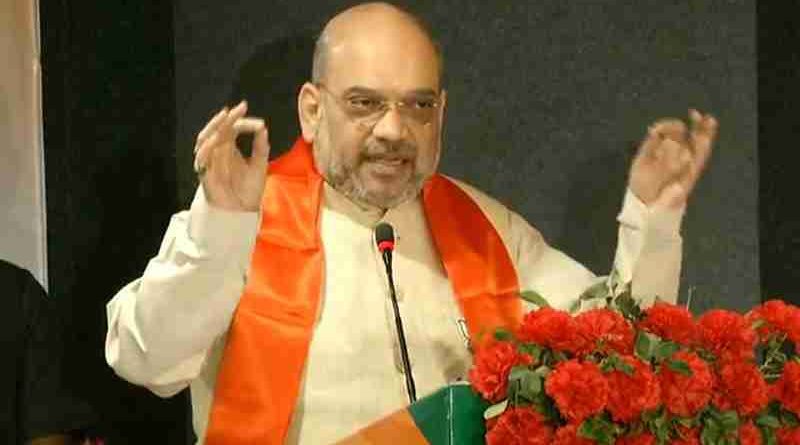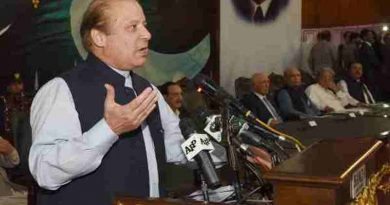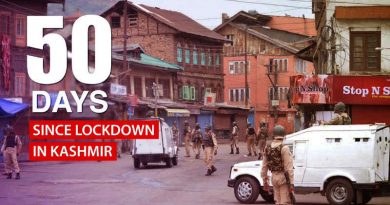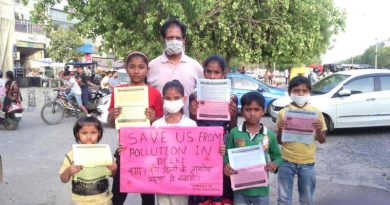Amit Shah Case: Lawyers Say Judge Loya Was Murdered
Amit Shah Case: Lawyers Say Judge Loya Was Murdered

It will be a foolishness to expect anything truthful in Amit Shah case from traditional Indian courts or investigation agencies which are tightly under the control of the ruling Modi regime.
By Rakesh Raman
A group of lawyers in Nagpur has swung into action to get a fresh probe started into the death of judge Brijgopal Harikishan Loya (B.H. Loya) who had died in mysterious circumstances.
With new evidence obtained through an RTI application, the lawyers from Nagpur Bar Association assert that judge Loya was murdered and the investigation into his death was terminated surreptitiously.
The RTI information – according to the lawyers – has revealed that judge Loya had not come to attend a marriage in Nagpur, as the shady investigation had stated. Rather, he was on official duty related to the case.
The lawyers who were holding a demonstration under the banner “Justice for Judge Loya” said in a video interview that the investigation was influenced to hide the truth, and in fact the judge was murdered.
Surprisingly, last month (November 2019), the Nagpur bench of Bombay High Court had rejected a petition filed by lawyer Satish Uke who had prayed for preserving records of ‘unfortunate deaths’ of city lawyer Srikant Khandalkar and retired judge Prakash Thombre related to the Loya death case.
While dismissing his petition, the high court has allowed him to challenge the order in the Supreme Court, although the top court has directed all courts not to entertain any petition related to judge Loya, who died on December 1, 2014 in Nagpur at Ravi Bhavan.
It is alleged that Loya – who was presiding over Soharabuddin Sheikh fake encounter case in which Bharatiya Janata Party (BJP) leader Amit Shah was an accused – was murdered. Now Amit Shah is India’s Home Minister in the government headed by Prime Minister (PM) Narendra Modi.
Lawyer Satish Uke – who is demanding a transparent investigation – says that all those who were seeking truth in this case have been deceived by the court as well as the investigating agencies while judge Loya was actually murdered.
Lawyers complain that the previous Maharashtra government of BJP headed by chief minister (CM) Devendra Fadnavis tried to hush up the Loya death case. Now they urge the new government formed by Shiv Sena-Nationalist Congress Party (NCP)-Congress alliance under CM Uddhav Thackeray to reopen the Loya death case.
Earlier, in 2018, Supreme Court’s 3-judge bench comprising Justices AM Khanwilkar, DY Chandrachud, and the then chief justice Deepak Misra had dismissed a slew of public interest litigation (PIL) petitions seeking an independent investigation into the death of judge Loya.
JUDGE LOYA DEATH CASE
An Indian publication named The Caravan had published a series of reports in 2017 about the death of judge Loya who was investigating the criminal case in which BJP president Amit Shah was a prime accused.
Reported by journalist Niranjan Takle, the reports suggested that judge Loya had died in mysterious circumstances in 2014, although his death was shown as a simple case of a heart attack.
As a Central Bureau of Investigation (CBI) judge in a special court of Mumbai, Loya was hearing a controversial case of the alleged ‘fake encounter’ killing of Sohrabuddin Sheikh in 2005. In this case, the prime accused Amit Shah was Gujarat’s home minister at the time of Sohrabuddin’s killing.
It was alleged that Sohrabuddin was killed at the behest of Amit Shah who was the home minister when Modi was Gujarat’s chief minister. In May 2014 when Modi – who himself was an accused in the Gujarat riots of 2002 – became the PM of India, the investigating agencies including the judiciary came under his control.
In June 2014, an earlier judge J.T. Utpat investigating the Amit Shah case was transferred, although the Supreme Court of India had directed that the same judge will handle the entire case.
According to the reports published by The Caravan, Judge Loya who replaced Utpat was offered a bribe of Rs. 100 crore by Chief Justice Mohit Shah for a favorable judgment in the Sohrabuddin case.
The reports add that Judge Loya refused to accept the bribe and decided to handle the case on its merits. He fixed December 15, 2014 the next date of hearing, but died in mysterious circumstances on December 1.
| Response on Social Media Click the following links to check out readers’ response for this article on Facebook. |
||
| Facebook Group 1 | Facebook Group 2 | Facebook Group 3 |
Journalist Niranjan Takle who was investigating this case interacted with Loya’s family to write his report that The Caravan first published in 2017. Since most other journalists in India’s mainstream media usually do not cover stories that criticize Modi and his friends like Amit Shah, the sudden death case of judge Loya was ignored by the big media houses.
But a few journalists, judges, and politicians demanded a thorough probe in this case. For example, Arun Shourie, a top journalist and rebel BJP leader suggested that more journalists must report this case and the Indian judiciary should intervene to reveal the truth behind Loya’s death.
Shourie also said that if judiciary is reluctant to take up this case, a small group of eminent citizens can form a kind of “people’s commission” to further investigate the case. Another BJP leader Shatrughan Sinha told The Caravan that the issue of the death of judge Loya should be raised in the Parliament.
According to The Caravan, a retired judge of the Bombay High Court B.H. Marlapalle wrote to Manjula Chellur, the chief justice of the high court, urging an “investigation by an SIT (Special Investigation Team)” into the suspicious circumstances surrounding the death of judge Loya.
RISKS IN INVESTIGATION
Although the demands for investigation are increasing, no investigation or investigating officer can dare to point the finger at Amit Shah. Judges and investigating officers know if judge Loya can die in an inexplicable manner, they also can be made to face the same fate.
Earlier it had happened in Vyapam scam in which, like Amit Shah, another BJP leader and Madhya Pradesh chief minister Shivraj Singh Chouhan was an accused. As the investigation in the Vyapam case was progressing, the witnesses and others familiar with the case started disappearing.
A Special Task Force (STF) submitted a list to High Court in 2015 informing that 23 people died “unnatural death.” Some media reports claimed that more than 40 people associated with the Vyapam scam had died under mysterious circumstances.
Obviously, most journalists and witnesses would be scared to say anything against any BJP leader such as Amit Shah because they have seen the fate of BJP’s opponents in such criminal cases. It is possible that since this story is developing again, people who know something about Loya’s death have already died “unnatural death” or in mysterious circumstances.
After the deaths of judge Loya and others who knew about this case, even the courts and the judges will be reluctant to go anywhere near this case. Earlier, in a similar case, it was largely alleged that the killings in 2002 Gujarat riots – in which nearly 2,000 Muslims were murdered – were executed at the behest of Modi who was then the chief minister of Gujarat. But the courts could not resolve this case transparently.
Although Indian courts exonerated Modi in that case, the U.S. administration denied visa to Modi in view of the allegations of human rights violations against him in the 2002 incidents of riots and carnage.
Similarly, the Rafale corruption case in which Modi is an accused has been closed by the Supreme Court without proper investigation. The less said about the Indian courts, the better.
So, it will be a foolishness to expect anything truthful in Amit Shah case from traditional Indian courts or investigation agencies which are tightly under the control of the ruling Modi regime.
Many judges in India cannot dare to work against Modi or his party colleagues such as Amit Shah. Those who dared are either removed from their positions or they simply die in mysterious circumstances.
As the courts and top judges are completely controlled by the government, last year a few judges had protested openly against the shady working of the Supreme Court of India. They were particularly concerned about the mysterious death of judge Loya, who was handling the Sohrabuddin Shah encounter case in which BJP president Amit Shah was the main accused.
A Supreme Court order stated that no further investigation is needed in the death of judge Loya. It is largely believed that the Modi government had influenced the court to get Amit Shah off the hook.
When courts were reluctant (or scared) to take up the Loya case, a 15-party opposition delegation had submitted a letter to the President of India Ram Nath Kovind, seeking an investigation into judge Loya’s death. But as it was expected, nothing happened because Kovind is also believed to be Modi’s own man.
INVESTIGATION STRUCTURE
However, if people want to know the truth in this case they should demand the formation of an all-party investigating team which should work like the Intelligence Committee and the Judiciary Committee in the U.S. Congress.
The all-party investigating team must be headed by a respected special judge like special counsel Robert Mueller who investigated the alleged ties of the U.S. President Donald Trump with Russia to deceptively win the presidential election in 2016. It should also have a UN (United Nations) observer.
Moreover, the media should be allowed to cover the hearings and all the hearings in the case must be live-streamed over multiple digital platforms. In all probability, this model should help find out the truth in judge Loya’s death case.
And if this model works, it can also be used to reopen and investigate other such cases such as the 2002 Gujarat riots case, Rafale corruption case, and others which were closed by the courts in a surreptitious manner.
This report will also be published in the January 2020 issue of “Legal Directions” newsletter that covers Indian and international legal affairs.
By Rakesh Raman, who is a national award-winning journalist and social activist. He is the founder of a humanitarian organization RMN Foundation which is working in diverse areas to help the disadvantaged and distressed people in the society. He also creates and publishes a number of digital publications on different subjects.





